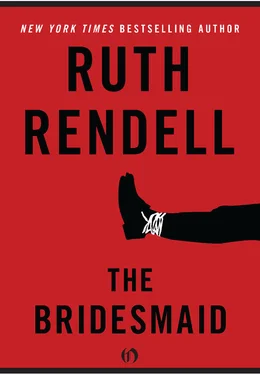Ruth Rendell - The Bridesmaid
Здесь есть возможность читать онлайн «Ruth Rendell - The Bridesmaid» весь текст электронной книги совершенно бесплатно (целиком полную версию без сокращений). В некоторых случаях можно слушать аудио, скачать через торрент в формате fb2 и присутствует краткое содержание. Год выпуска: 2010, Издательство: Open Road Integrated Media LLC, Жанр: Триллер, на английском языке. Описание произведения, (предисловие) а так же отзывы посетителей доступны на портале библиотеки ЛибКат.
- Название:The Bridesmaid
- Автор:
- Издательство:Open Road Integrated Media LLC
- Жанр:
- Год:2010
- ISBN:нет данных
- Рейтинг книги:3 / 5. Голосов: 1
-
Избранное:Добавить в избранное
- Отзывы:
-
Ваша оценка:
- 60
- 1
- 2
- 3
- 4
- 5
The Bridesmaid: краткое содержание, описание и аннотация
Предлагаем к чтению аннотацию, описание, краткое содержание или предисловие (зависит от того, что написал сам автор книги «The Bridesmaid»). Если вы не нашли необходимую информацию о книге — напишите в комментариях, мы постараемся отыскать её.
The Bridesmaid — читать онлайн бесплатно полную книгу (весь текст) целиком
Ниже представлен текст книги, разбитый по страницам. Система сохранения места последней прочитанной страницы, позволяет с удобством читать онлайн бесплатно книгу «The Bridesmaid», без необходимости каждый раз заново искать на чём Вы остановились. Поставьте закладку, и сможете в любой момент перейти на страницу, на которой закончили чтение.
Интервал:
Закладка:
Mechanically he began opening the cardboard carton and easing out the slab onto the cushions of Mrs. Ripple’s settee. The dog was what had shocked him, he realised, the presence of the dog, the kind of dog. He wanted to ask Mrs. Ripple who the woman was, yet he already knew who she was. He knew who she was and he knew who the dog was. They were Thiefie and Ebony.
“Well, I suppose that’s an improvement,” Mrs. Ripple was saying.
Pearl ran a red-nailed finger over the surface of the marble. “At least you won’t get soap and goodness knows what else trapped in the cracks. Imagine with that other one, the gunge that would have built up. I mean it doesn’t bear thinking of.”
“They don’t think of it, Pearl. They’re men who design them, you see. We’d see some changes if it was women who had a say in it.”
Philip would have liked to tell her that, in fact, this particular series of vanity units had all been designed by a woman. Once, that is, he would have liked to tell her. Now his mind had curiously blanked, emptied but for the presence in it of a small black Scottie dog that Senta had named Ebony and heard whimpering as its master died.
“Well, if you’re happy with it,” he heard himself saying, “I’ll take it upstairs for you. The fitter will be along before the end of the week.”
“Have you noticed, Pearl, how it’s always the same with these people? The beginning of the week is Wednesday morning but ‘before the end of the week’ is late Friday afternoon.”
He scarcely heard her. He carried the marble slab up the staircase, very much aware of its weight, aware of it as a man three times his age might be. Inside the new bathroom he crossed to the window, now fussily cluttered with floral Austrian blinds, and gazed at the back of Arnham’s house. The may tree, which when he first saw it had been festooned with blossoms, now bore a harvest of berries changing from green to russet colour. Beneath stood the figure of Cupid with his bow and quiver which had replaced Flora. But he noticed something else about that garden which struck him hollowly. No one had tended it for weeks. No one had mown the lawn or pulled out a weed or trimmed off a dead head. Rank grass grew six inches high with yellow and white flowering weeds among it.
The little black dog came running into the garden from round the side of the house. It disappeared into the tall grass as a wild animal disappears into the bush. Ebony, he thought, Ebony. Philip turned away and came out on to the landing. Sick though he felt, panic-stricken in some fearful, unanalysable way, he had to know the truth. If necessary, he would have to ask. In his present state of near certainty, which was still uncertainty, it would be unthinkable to leave here and drive home, to carry with him a doubt that would gnaw like a rat. He could feel in anticipation (through experience) the pain of it.
He didn’t have to ask. He stood on the landing, holding on to the railing at the head of the stairs, listening to their voices. The door into the living room was open and he heard Mrs. Ripple say, “You know who that was?”
“Who what was?”
“The woman with the dog who came in to ask if I knew anyone who’d help her with her garden.”
“I didn’t catch the name.”
“Myerson’s her name. Myerson. Mark you, I don’t like dogs in the house, I wouldn’t have had it if it was anyone else, but I couldn’t very well say anything in the circumstances. I’m surprised the name didn’t ring a bell with you. It was her husband that was murdered—when would it have been? A month ago? Five weeks?”
“Murdered?” said Pearl. “What was the name again?”
“Harold. Harold Myerson.”
“You may have mentioned it in your letter. I never read those things in the paper, I avoid those things. I may be a coward but I can’t bear things like that.”
“He was murdered in Hainault Forest,” said Mrs. Ripple. “It was on a Sunday morning, a beautiful sunny morning. He was stabbed in the heart while he was out with that dog.”
CHAPTER EIGHTEEN
She sat on the bed and he sat in the wicker chair. The window had been open but he had closed it out of fear. There was the room they were in and the looking-glass country of that room reflected in the tilted mirror—greenish, watery, clouded, a land of swamps.
“I told you I killed him, Philip,” she said. “I told you over and over I stabbed him with my glass dagger.”
He couldn’t speak. It had been as much as he could do to articulate the words that demanded the truth from her. She was calmer and more reasonable, even gently amused, than he had ever known her.
“I see now that I have killed the wrong man. But you did tell me over and over that Gerard Arnham lived there. You showed me the house. We drove past and you pointed to it and you said, ‘That’s where Gerard Arnham lives.’ I think you have to admit, Philip, that it was you who made the mistake, not me.”
She spoke as if his contention was only that she had picked the wrong victim. She might have been mildly reproving him for being late for an engagement. Philip had dropped his head into his hands. He sat there feeling the sweat form between his fingertips and the hot pulsing skin of his forehead. Her hand on his arm, the touch of her little child’s hand, made him jump and flinch. It was like a lighted match brought close against bare flesh.
“It doesn’t really matter, Philip,” he heard her say. He heard her voice soft and sweetly reasonable. “It doesn’t really matter who I killed. The point was to kill someone to prove my love for you. I mean—if you don’t mind my saying this—it wasn’t the old down-and-out what’s-he-called, Joley, that you killed, was it? You made a mistake there as well. But we did do it.” The sound she made was a soft, rueful giggle. “Next time,” she said, “I expect we’d be better at it, we’d be more careful.”
He had jumped up and was on her before he realised what was happening. Her shoulders were in his hands, grasped with the nails digging in, and he was crashing her body up and down on the bed, pounding the frailness of her into the mattress, the flimsy ribcage, the bird’s bones. She didn’t fight him. She yielded to his violence moaning a little. When he began to strike her, she covered her face with her hands.
The sight of the ring he had given her, the silver and the milky stone, stopped him. That and her face, so feebly protected, cowering from his flailing hands, seemed to paralyse him in mid-onslaught. He had been the man who hated violence, who couldn’t imagine himself performing any brutish act. Even talking about it had offended him. Even thinking of it had seemed a source of corruption.
Upstairs the “Great Waltz” from Rosenkavalier sent its sweet, painful strains down through the ceiling. Disgusted with himself, he fell across the bed. He lay in a state of shock, unable to think, wanting to die.
Presently he was aware she had sat up. She was wiping her eyes with her fingers. Somehow his blows had cut her face, there was a trace of blood on one cheekbone. It was while she had been protecting her face with her hands that the moonstone ring had been pressed into the skin. Blood got onto her fingertip and she flinched when she saw it. She crouched on all fours, looking into the mirror at the scratch on her face.
“I’m sorry I hit you,” he said. “I went mad.”
“That’s all right,” she said. “It doesn’t matter.”
“It does. I shouldn’t have hit you.”
“You can hit me if you want. You can do what you like with me. I love you.”
He was stunned by her. His shock was so immense as to have bludgeoned him into a kind of unconsciousness. He could only look helplessly at her and hear those words, uttered in an impossible context. Her face was soft with love, as if the features had begun to melt. Then blood marred a silvery-white perfection, made her human. All too human.
Читать дальшеИнтервал:
Закладка:
Похожие книги на «The Bridesmaid»
Представляем Вашему вниманию похожие книги на «The Bridesmaid» списком для выбора. Мы отобрали схожую по названию и смыслу литературу в надежде предоставить читателям больше вариантов отыскать новые, интересные, ещё непрочитанные произведения.
Обсуждение, отзывы о книге «The Bridesmaid» и просто собственные мнения читателей. Оставьте ваши комментарии, напишите, что Вы думаете о произведении, его смысле или главных героях. Укажите что конкретно понравилось, а что нет, и почему Вы так считаете.











